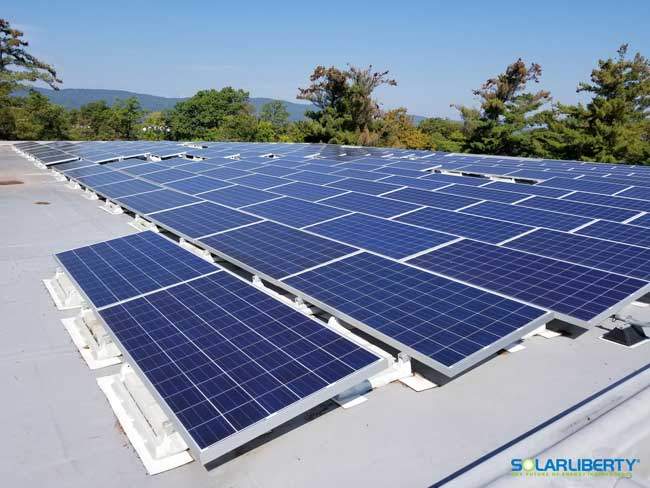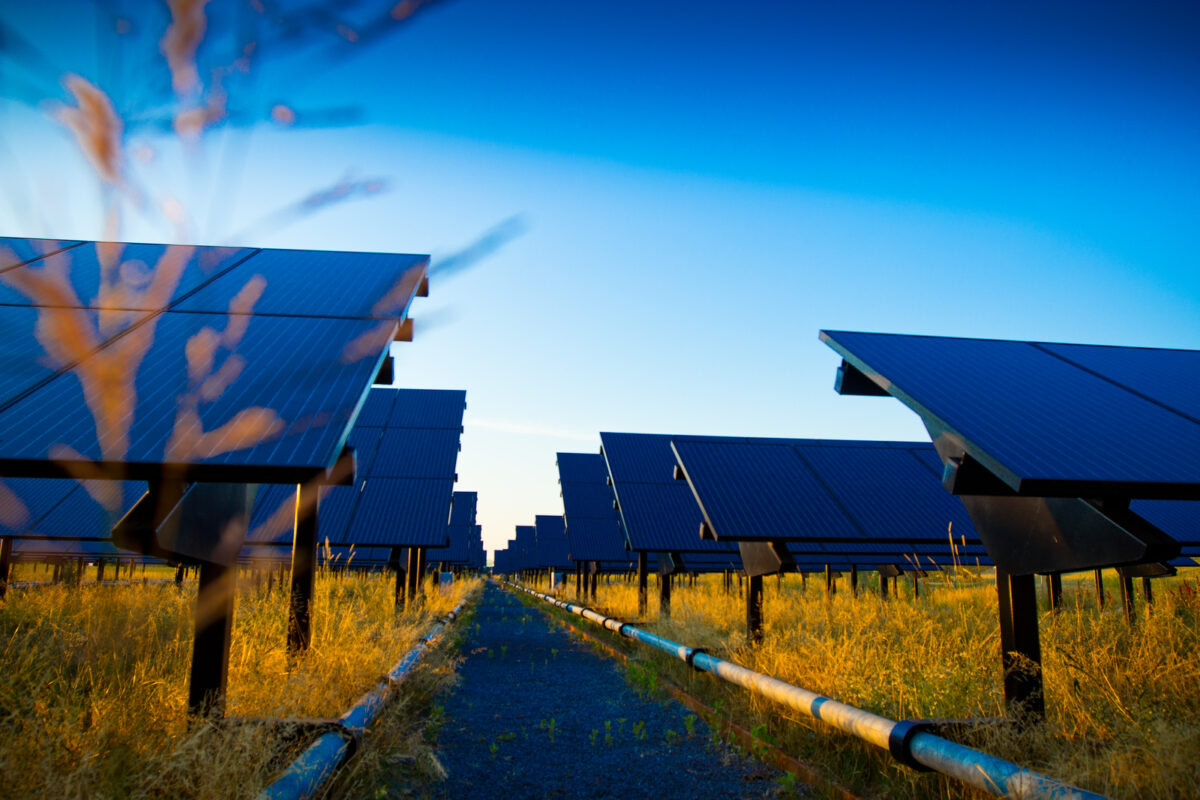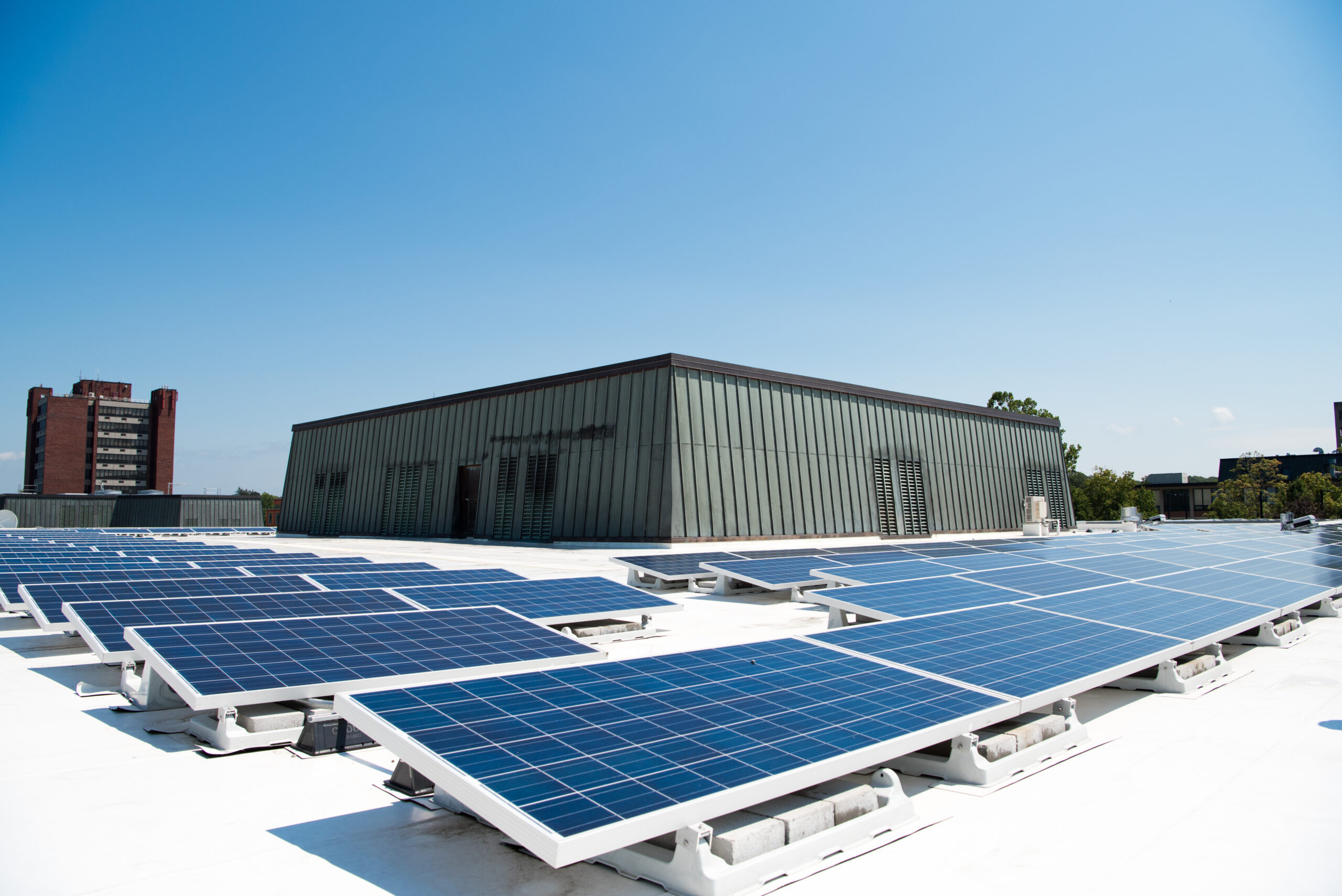Library Patrons ‘Check-out’ Solar Energy
• Town of Esopus Library uses Recovery Act funds to install 28kW of photovoltaics
• Located at a prominent intersection – the “gateway” to town
• Combination of roof-mounted and ground-mounted units to supply 30% of the Library’s electricity
Hemingway and Twain aren’t all that’s being checked out at the Town of Esopus Library these days – newly installed photovoltaic arrays are generating electricity, interest and pride in this hamlet located in the Hudson River Valley.
Frequented by students, families, and civic organizations from Port Ewen and surrounding Ulster County communities, the Library serves as a center for learning. Recognizing its role as educator and community leader, the Library used a $96,790 award from the American Recovery and Reinvestment Act to install a 22.5kW roof mounted photovoltaic system, and a 5.5kW ground- mounted photovoltaic system.
“We’re hoping to be a place to come to learn about renewable energy,” says Library Director Kelly Tomaseski. “We think that people will be more likely to invest in a similar project if they can see it in practice.”
These sentiments are shared by Adam Rizzo, president of Solar Liberty, the project installation firm. “It’s important to demonstrate that solar energy is a viable way to power a building,” he says. “Community centers, nonprofit buildings, and schools are especially important for promoting solar energy. Seeing is believing. This project proves to business people and homeowners that a solar panel system gives a strong return on investment in New York State.”
The total project cost of $150,690 was shared by the Library, which together with a Library Construction Grant from New York State contributed $53,900.
Always Looking Ahead
This is not the first time the Library has taken a leadership role in “going green.” The Library was awarded a New Construction High Performance Building Award from the New York State Energy Research and Development Authority (NYSERDA). This award recognized the energy efficiency of the facility, including its innovative ground exchange heating and cooling system.
Continued participation in NYSERDA programs speaks to the energy-conscious leadership team at the Library, as well as to the ability of NYSERDA offerings to help customers achieve improved sustainability.
“NYSERDA programs offer opportunities for saving energy,” says Randolph Horner, the Library’s solar project manager. “This project will be visited and remarked upon,” he says. “The system serves as a prominent display of on-site distributed generation. While small, there is a measurable benefit over the service life of the building in contributing to a reduction in carbon dioxide emissions.”
Energy and Cost Savings
The new solar system installed by this ARRA funded project is expected to generate approximately 31,200 kWh of electricity, annually. This will provide 30 percent of the Library’s electricity use and save nearly $4,000 in energy costs each year. The 96 230 watt Sharp® photovoltaic panels, made in Memphis, Tennessee, along with the PVPowered™ 30 kW inverter and rooftop DPW Solar Mounting System, were installed by a crew of eight electricians over a period of three days.
“Installing solar energy systems is a job that has to be done on site with local labor. Using locally-produced components makes our offer even more competitive,” explains Mr. Rizzo of Solar Liberty. “We use a local warehouse, local transportation companies, and our suppliers for copper wire, ballast blocks, and other components come from Upstate New York. Recently, we began manufacturing our own solar panel racking system at a local facility. It’s a 100% locally-made product.”
Project Expands
The Town of Esopus is no stranger to transitioning toward a lower carbon footprint, and partnering with NYSERDA. The Esopus Town Hall hosts a 77.22 kW ground mounted photovoltaic system, a project that received a $194,440 NYSERDA incentive and helped to inspire the library to follow suit.
Luckily, Recovery Act funds became available at precisely the right moment. “The Library was originally built in such a way that solar panels could one day be installed,” says Ms. Tomaseski. “We paid careful attention to the solar installation market, and we were ready when the ARRA opportunity came along.”
Mr. Horner agrees. “Progressive town policy helped alert the Library to how beneficial a system like this could be. The Library was well positioned to not only apply for an ARRA grant, but to be a well prepared contributing project partner.”
More good fortune would soon follow. Successful municipal procurement proceedings allowed for completion of the initially slated roof system with funds to spare. In turn, the Library worked with NYSERDA to modify the project contract and spend the remaining resources and increase the system size. Thus, the 5.5kW ground system will increase the total project size by 24%, and upon completion the project will deliver approximately 120% of the electricity that the grant was based on, while still staying within the original cost.
“The additional ground mount wouldn’t have happened if Solar Liberty hadn’t used the economies of scale of our other installations to lower the project costs,” states Mr. Rizzo. “Our goal is to cover New York State with solar panels. To do this, we have to look at the big picture and give all of our customers the benefits of our large volume work. Competitive budgeting doesn’t end when stimulus funds are received,” he says. “It’s about being flexible and creating the best project possible right to the end.”
One kWh at a Time
The main electrical room is located directly below the roof-mounted installation and houses the inverter, which allows for easy interconnection with the building’s electrical and distribution system. The Library intends to incorporate the mechanical components of the system in a future educational series. “We plan to show how accessible solar energy really is,” says Ms. Tomaseski. Following the move to its new location, Library patronage tripled. With programs becoming much fuller, “we plan to use some of the energy cost savings to expand library offerings,” says Ms. Tomaseski.
To follow project progress visit the Town of Esopus Library online at http://www.esopuslibrary.org/, and keep current with the Library’s BookMark Newsletter http://www.esopuslibrary.org/BookMark.pdf.
The Town of Espopus Public Library received this award from the U.S. Department of Energy’s State Energy Program. The State Energy Program provides grants to states and directs funding to State Energy Offices from technology programs in DOE’s Office of Energy Efficiency and Renewable Energy. States use grants to address their energy priorities and to adopt emerging renewable energy and energy efficiency technologies. SEP is distributing $3.1 billion of funding to the states and U.S. territories under the 2009 Recovery Act.”
NYSERDA




